Nelson Mandela
人教版高中英语必修一 教案: unit 5 Nelson Mandela--a modern hero Reading
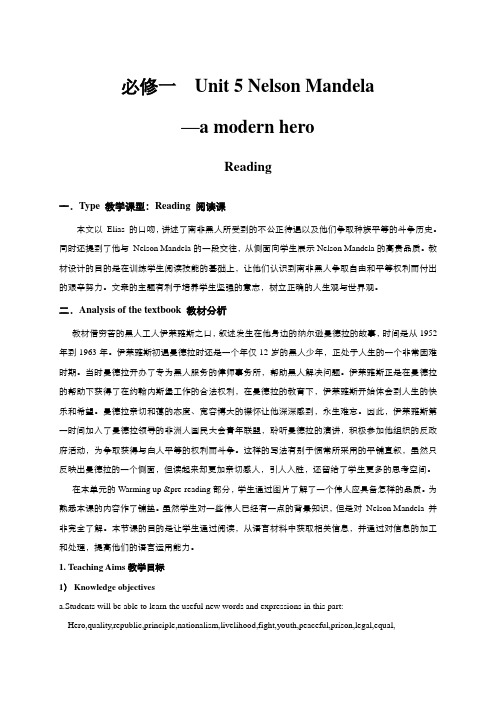
必修一Unit 5 Nelson Mandela—a modern heroReading一.Type 教学课型:Reading 阅读课本文以Elias 的口吻,讲述了南非黑人所受到的不公正待遇以及他们争取种族平等的斗争历史。
同时还提到了他与Nelson Mandela的一段交往,从侧面向学生展示Nelson Mandela的高贵品质。
教材设计的目的是在训练学生阅读技能的基础上,让他们认识到南非黑人争取自由和平等权利而付出的艰辛努力。
文章的主题有利于培养学生坚强的意志,树立正确的人生观与世界观。
二.Analysis of the textbook 教材分析教材借穷苦的黑人工人伊莱雅斯之口,叙述发生在他身边的纳尔逊曼德拉的故事,时间是从1952年到1963年。
伊莱雅斯初遇曼德拉时还是一个年仅12岁的黑人少年,正处于人生的一个非常困难时期。
当时曼德拉开办了专为黑人服务的侓师事务所,帮助黑人解决问题。
伊莱雅斯正是在曼德拉的帮助下获得了在约翰内斯堡工作的合法权利,在曼德拉的教育下,伊莱雅斯开始体会到人生的快乐和希望。
曼德拉亲切和蔼的态度、宽容博大的襟怀让他深深感到,永生难忘。
因此,伊莱雅斯第一时间加入了曼德拉领导的非洲人国民大会青年联盟,聆听曼德拉的演讲,积极参加他组织的反政府活动,为争取获得与白人平等的权利而斗争。
这样的写法有别于惯常所采用的平铺直叙,虽然只反映出曼德拉的一个侧面,但读起来却更加亲切感人,引人入胜,还留给了学生更多的思考空间。
在本单元的Warming up &pre-reading部分,学生通过图片了解了一个伟人应具备怎样的品质。
为熟悉本课的内容作了铺垫。
虽然学生对一些伟人已经有一点的背景知识,但是对Nelson Mandela 并非完全了解。
本节课的目的是让学生通过阅读,从语言材料中获取相关信息,并通过对信息的加工和处理,提高他们的语言运用能力。
1. Teaching Aims教学目标1)Knowledge objectivesa.Students will be able to learn the useful new words and expressions in this part:Hero,quality,republic,principle,nationalism,livelihood,fight,youth,peaceful,prison,legal,equal,law,advise,continue,gold,passbook,ANC,league,stage,vote,position,accept,violence,devote,vote, guidance, blow up, in troubleb. Enable the students to read Elias’ storyc. Guide the students to know the qualities of Nelson Mandela as a great leader2) Ability objectivesa.Develop the students ’reading skills, such as fast reading ,careful reading and summarizingb.Improve the students’ comprehension ability3) Emotion objectivesa,Understand the qualities great person have in common and learn the fine qualities from themb.Develop the students’ moral quality2.Teaching important points教学重点a.Enable the students to read Elias’ story and Learn to grasp the main idea of the text.b.Enable students to talk about the fine qualities of great people,especially Nelson Mandelac.Improve the students’ reading ability3.Teaching difficult points 教学难点a.How to grasp the main idea of the text.b.How to help develop students’ reading abilityc.How to help students learn from Nelson Mandela4.Teaching methods 教学方法a.Student-centeredb.Task-based teaching method(任务型教学)c.Discussion5.Learning methods 学习方法Individual or pair work and group work6.Teaching Aids 教具准备The multimedia三.教学设计1. 总体思路本堂课的主要内容分为四大部分,Pre-reading(阅读前活动) ,while –reading(阅读中活动),post-reading(阅读后活动)以及discussion(讨论) and role play 。
Who_is_Nelson_Mandela
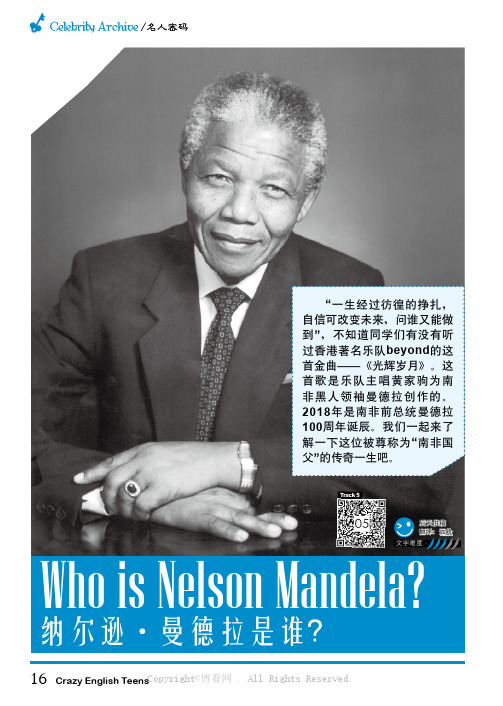
后天供稿翻译:远航文字难度·Who is Nelson Mandela?纳尔逊·曼德拉是谁?Track 51) endure [In5djuE ] v. 忍受2) dignity [5dI^nItI ] n. 尊严3) treat [tri:t ] v. 对待4) subject [5sQbdVIkt ] n. 经受者,对象5) racism [5reIsIzEm ] n. 种族主义6) vote [vEJt ] n. 投票权7) property [5pr ɒpEtI ] n. 财产8) capture [5kAptFE ] v. 抓捕9) imprison [Im5prIzn ] v. 监禁10) disharmony [5dIs5hB:mEnI ] n. 不和谐11) release [rI5li:s ] n. 释放12) violence [5vaIElEns ] n. 暴力13) charity [5tFArItI ] n. 慈善Nelson Mandela was born in July 1918. He is SouthAfrica’s first black President (1994~1999) and a braveman who 1)endured 27 years in prison with 2)dignity .Nelson’s parents couldn’t read or write, and he wasthe first in his family to attend school at age seven. Hisfather died when he was about nine, and he was sentto live with Jongintaba, the king of the Thembu, hispeople, and 3)treated as their son.Nelson went to University at Fort Hare and later theUniversity of Witwatersrand. He made many friends ofall colours and nationalities, but was the 4)subject of5)racism . Nelson became increasingly politically active,joining the African National Congress (the ANC) in1944 and helping to form the ANC Youth League. Atthe time in South Africa there were many things that theblacks were not allowed to do, including 6)vote and own7)property , and the ANC wanted to change that. Thispolicy was called “apartheid ” and the African NationalCongress was anti-apartheid.In 1962 Nelson was 8)captured and 9)imprisonedfor five years for encouraging the country to strike; thefollowing year he was charged with trying to overthrowthe government, and sentenced to life imprisonment.Nelson spent his many hard years in prisonstudying when he could and keeping in touch with theever-increasing 10)disharmony in South Africa, whichthreatened to break out into civil war. All over the worldpeople began to campaign for his 11)release . In 1990South Africa’s President de Klerk met Nelson andarranged for him to be released.After his release, Nelson and de Klerk workedtogether to end 12)violence in the country and restoreorder, and Nelson was elected President in 1994,serving for one term.After his presidency, Nelson Mandela focused on13)charity , setting up the Nelson Mandela Children’sFund and Nelson Mandela Foundation to fight povertyand HIV/AIDS. He won the Nobel Peace Prize (in 1993)and the US Presidential Medal of Freedom.纳尔逊·曼德拉出生于1918年7月。
Nelson Mandela
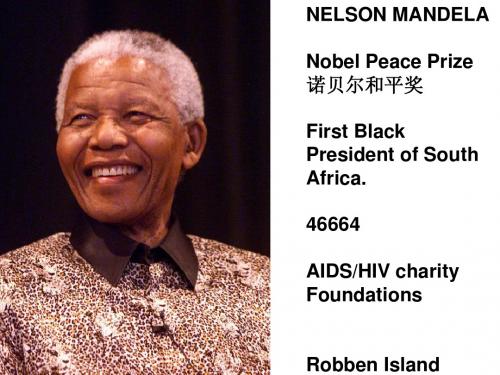
• Cape Town • When you are there, see the famous Table Mountain and eat delicious food. Cape Town is _____ _____ Robben Island Nelson Mandela _____. close to _______ to _____ in prison there. used be
NELSON MANDELA Nobel Peace Prize 诺贝尔和平奖 First Black President of South Africa. 46664 AIDS/HIV charity Foundations
Robben Island
Nelson Mandela
纳尔逊·罗利赫拉赫拉·曼德拉(Nelson Rolihlahla Mandela)是享誉全球的诺 贝尔和平奖得主。为了推翻南非白人种 族主义统治,他进行了长达50年 (1944—1994年)艰苦卓绝的斗争,铁 窗面壁28年(1962—1990年)。最终, 从阶下囚一跃成为南非第一任黑人总统, 为新南非开创了一个民主统一的局面。 南非终身名誉总统:纳尔逊·罗利赫 拉赫拉·曼德拉( Nelson Rolihlahla Mandela )(1918-)
• Port Elizabeth also has beautiful beaches. This for city is famous ________its gardens and parks _______ _______many interesting plants and which contain flowers. You can see plenty _____ birds there. of
曼德拉的一生英语短作文
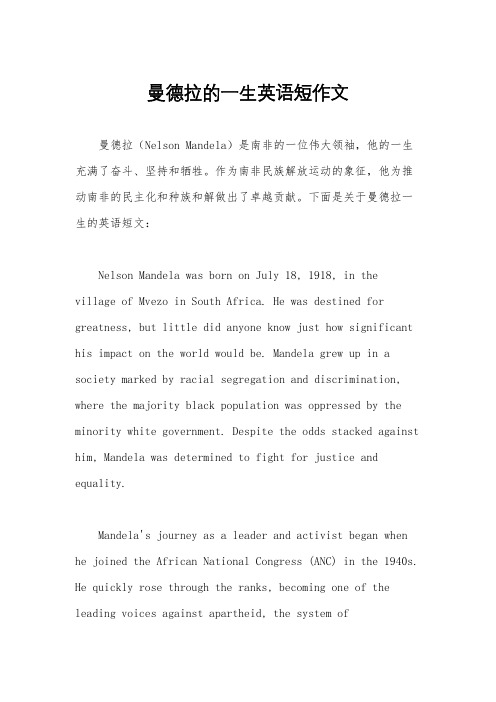
曼德拉的一生英语短作文曼德拉(Nelson Mandela)是南非的一位伟大领袖,他的一生充满了奋斗、坚持和牺牲。
作为南非民族解放运动的象征,他为推动南非的民主化和种族和解做出了卓越贡献。
下面是关于曼德拉一生的英语短文:Nelson Mandela was born on July 18, 1918, in thevillage of Mvezo in South Africa. He was destined for greatness, but little did anyone know just how significant his impact on the world would be. Mandela grew up in a society marked by racial segregation and discrimination, where the majority black population was oppressed by the minority white government. Despite the odds stacked against him, Mandela was determined to fight for justice and equality.Mandela's journey as a leader and activist began when he joined the African National Congress (ANC) in the 1940s. He quickly rose through the ranks, becoming one of the leading voices against apartheid, the system ofinstitutionalized racial segregation enforced by the South African government. Mandela's activism landed him in hot water with the authorities, and he was arrested multiple times for his political activities.In 1964, Mandela was sentenced to life in prison forhis involvement in anti-apartheid activities. He spent the next 27 years behind bars, enduring harsh conditions and separation from his family. Despite the hardships, Mandela remained steadfast in his commitment to the cause of freedom. His imprisonment only served to galvanize support for the anti-apartheid movement both within South Africaand around the world.Finally, in 1990, Mandela was released from prison, signaling the beginning of a new era for South Africa. He wasted no time in working towards reconciliation and democracy, leading negotiations with the government to dismantle apartheid and establish free and fair elections. Mandela's efforts culminated in the historic 1994 elections, in which he was elected as South Africa's first black president.As president, Mandela faced the daunting task of leading a deeply divided nation towards unity and reconciliation. He embraced the concept of forgiveness, famously declaring, "Courageous people do not fear forgiving, for the sake of peace." Mandela workedtirelessly to bridge the gap between black and white South Africans, promoting policies of inclusivity and equality.Mandela's presidency was marked by significant progress in areas such as healthcare, education, and social welfare. He also played a key role in promoting peace and stability across the African continent, earning him widespread admiration and respect both at home and abroad. Despite stepping down as president in 1999, Mandela continued to be a global advocate for human rights and social justice until his passing in 2013.In conclusion, Nelson Mandela's life serves as a testament to the power of perseverance, courage, and forgiveness. From his humble beginnings in rural South Africa to his historic presidency, Mandela remained true tohis principles and never wavered in his commitment to justice and equality. His legacy continues to inspire people around the world to strive for a better, more just society.。
nelsonmandela英文简介带翻译
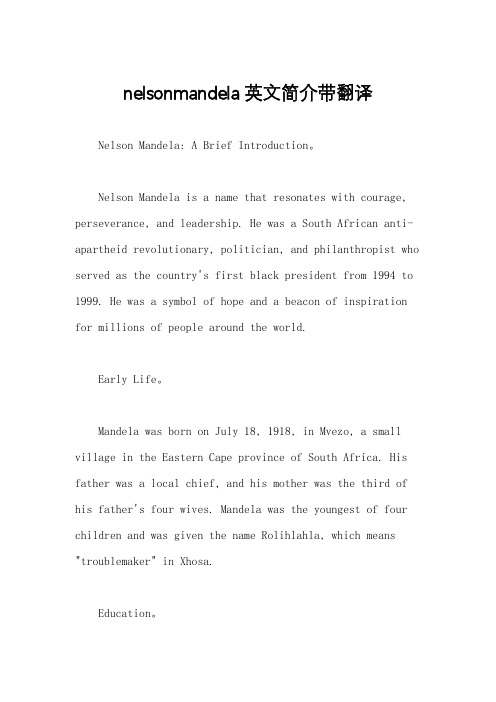
nelsonmandela英文简介带翻译Nelson Mandela: A Brief Introduction。
Nelson Mandela is a name that resonates with courage, perseverance, and leadership. He was a South African anti-apartheid revolutionary, politician, and philanthropist who served as the country's first black president from 1994 to 1999. He was a symbol of hope and a beacon of inspiration for millions of people around the world.Early Life。
Mandela was born on July 18, 1918, in Mvezo, a small village in the Eastern Cape province of South Africa. His father was a local chief, and his mother was the third of his father's four wives. Mandela was the youngest of four children and was given the name Rolihlahla, which means "troublemaker" in Xhosa.Education。
Mandela attended primary school in Qunu, where he was given the name Nelson by his teacher. He then went on to attend secondary school in Clarkebury and Healdtown, where he excelled academically and participated in various sports. In 1940, he enrolled at the University of Fort Hare, where he studied law and politics.Political Activism。
nelson mandela关于语言的名言

nelson mandela关于语言的名言1. "If you talk to a man in a language he understands, that goes to his head. If you talk to him in his own language, that goes to his heart."2. "Language is not just a means of communication, it is the essence of our being."3. "Language is the key that unlocks the door to understanding different cultures and perspectives."4. "Language is the bridge that connects people of different backgrounds and enables them to work together towards a common goal."5. "We should celebrate and embrace linguistic diversity, as it enriches our society and promotes tolerance and understanding."6. "Language has the power to build bridges, break down barriers, and inspire change."7. "By learning someone's language, we not only gain access to their thoughts but also gain a deeper understanding of their soul."8. "Language is a tool of empowerment, enabling individuals to express themselves and advocate for their rights."9. "Language is a powerful weapon against oppression, as it gives a voice to the voiceless."10. "When we communicate in someone's native language, weshow respect and appreciation for their culture and heritage." 11. "Language embodies the spirit of a nation and serves as a symbol of its identity."12. "Through language, we preserve our history and pass on our traditions to future generations."13. "Language connects us to our roots and reminds us of where we came from."14. "In a multilingual society, understanding and accepting different languages is crucial for social cohesion and unity."15. "Language has the power to heal wounds and reconcile divided communities."16. "By embracing multiple languages, we enrich our minds and expand our horizons."17. "Language is a reflection of our thoughts, and through it, we can shape a better world."18. "The ability to learn and speak another person's language is a gesture of goodwill and promotes global friendship."19. "Language is the melody of the soul, and when we understand each other's melodies, harmony emerges."20. "Through language, we express our aspirations and hopes for a better future."21. "Language is the thread that weaves the fabric of humanitytogether."22. "Speaking someone's language is not just about words; it's about understanding their experience and perspective."23. "Language is the foundation of education and the key to unlocking opportunities for future generations."24. "Linguistic diversity is a treasure that should be cherished and protected."25. "Through language, we break down the walls of ignorance and build bridges of understanding."26. "Language is the lens through which we view the world, and by understanding different languages, our perspective becomes broader."27. "Language connects us to our ancestors and future generations, creating a sense of continuity and belonging."28. "The richness of a culture can be felt through its language, art, and traditions."29. "By learning someone's language, we open doors to meaningful connections and mutual respect."30. "Language promotes empathy and understanding, helping us to walk in someone else's shoes."31. "Through language, we express our deepest emotions and connect with others on a profound level."32. "Language is a gift that allows us to share our stories, dreams, and struggles with others."33. "When we speak someone's language, we show them that they matter and their voice is heard."34. "By preserving endangered languages, we preserve the diversity and richness of the human experience."35. "Language is a tool for peacebuilding and reconciliation, as it helps us to see the common humanity in all people."36. "Language is the foundation of a strong society, where individuals can freely express themselves and engage in meaningful dialogue."37. "Through language, we build bridges of understanding and dismantle the walls of prejudice and discrimination."38. "Language allows us to celebrate our differences and find common ground amidst diversity."39. "Speaking someone's language is an act of love and respect, fostering a sense of belonging and acceptance."40. "Language has the power to inspire generations and ignite movements for social change."41. "By valuing and promoting native languages, we protect and honor the cultural heritage of indigenous communities."42. "Language connects us to our ancestors, enabling us toappreciate their wisdom and learn from their experiences."43. "Through language, we can amplify marginalized voices and advocate for social justice."44. "Language is a vibrant tapestry that tells the story of our shared humanity."45. "Linguistic diversity is a treasure that enriches us all and strengthens the fabric of society."46. "Language is the key that unlocks the doors of understanding between cultures."47. "By speaking someone's language, we show them that their culture is valued and respected."48. "Language is the vehicle through which we share knowledge and ideas, propelling progress and innovation."49. "Linguistic diversity is a reflection of the diversity of human thought and expression."50. "Language is a bridge that allows us to connect with people across borders and build international friendships."51. "Through language, we can challenge prejudices and promote social inclusivity."52. "Linguistic diversity is an asset that should be celebrated and utilized to foster creativity and innovation."53. "Language is a tool for diplomacy, enabling effectivecommunication and dialogue between nations."54. "By embracing linguistic diversity, we create a more inclusive and equitable society."55. "Language is the foundation of a strong and vibrant culture."56. "Through language, we can preserve and share the knowledge and wisdom of our ancestors."57. "Language is the key to understanding different perspectives and fostering empathy."58. "By learning someone's language, we open doors to economic opportunities and cross-cultural collaboration."59. "Language is a powerful force for change and social transformation."60. "Through language, we honor and respect the experiences and contributions of all people."。
人教版高中英语必修1Unit 5 Nelson Mandela reading
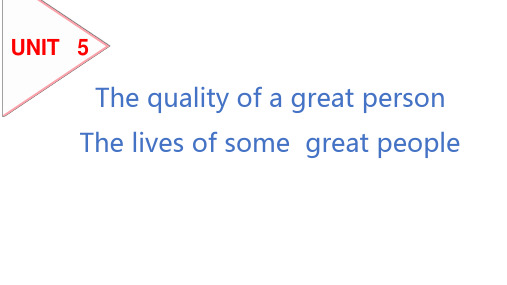
例句: 1. As soon as he got inside, the dog shook himself. 他一进来,狗就开始摇头摆尾。 2. They stopped you as soon as you deviated from the script. 一旦你偏离了剧本的内容,他们就会喊停。 3. As soon as the two chicks hatch, they leave the nest burrow. 两只小鸟一出壳就离开了巢穴。 4. As soon as we were inside, the rain began to bucket down. 我们刚进屋,大雨便倾盆而下。 5. As soon as relations improve they will be allowed to go. 一旦关系有所改善,他们就可以获准离开。
She wanted to continue working after she was married.
她想结婚后继续工作。
拓展练习
He was generous with his time, ________ I was grateful for. A.which B.that C.as D.不填
Be generous with your praise. Point out the specifics of their personality and behaviour that add value.
大胆的赞赏他们。大方的对待称攒,指出他们的性格 特征和行为价值。
In a nutshell, be generous with the information you do possess, but also be aware and open about the things that you do not know.
曼德拉人物介绍英语作文

Nelson Mandela,a name synonymous with resilience,leadership,and the indomitable spirit of freedom,was born on July18,1918,in the village of Qunu,located in the Eastern Cape of South Africa.His life was a testament to the power of perseverance and the unyielding quest for justice and equality.Mandelas early life was steeped in the traditions of the Thembu tribe, which instilled in him a sense of dignity and respect for community.His father,Gadla Henry Mphakanyiswa,was a chief,and his mother,Nosekeni Fanny,was a daughter of a chief,both of whom recognized the potential in young Mandela.They sent him to a Methodist mission school,where he was given the name Nelson,and later to Clarkebury Boarding Institute and the University of Fort Hare.Mandelas political awakening began during his university years,where he became involved in the African National Congress ANC,a movement that would define his lifes work.He was expelled from the university for his involvement in a student protest,but this setback did not deter him. Instead,it fueled his commitment to the cause of ending racial segregation and inequality in South Africa.In the1940s and1950s,Mandela emerged as a prominent figure in the antiapartheid movement.He cofounded the ANC Youth League and later became a leader within the organization.His charisma and eloquence made him a powerful orator,inspiring countless South Africans to join the struggle for freedom.Mandelas commitment to nonviolent resistance was evident in his early activism.However,as the governments oppressive tactics escalated,so too did the methods of the resistance.In1961,Mandela cofounded Umkhonto we Sizwe,the armed wing of the ANC,which engaged in acts of sabotage against the apartheid regime.This marked a significant shift in his approach to the struggle,one that would ultimately lead to his arrest and imprisonment.On August5,1962,Mandela was arrested and charged with inciting workers to strike and leaving the country without a passport.He was sentenced to five years in prison.However,his legal troubles were far from over.In1963,he was brought to trial again,this time for sabotage and conspiracy to overthrow the government.The Rivonia Trial,as it came to be known,was a turning point in Mandelas life and the antiapartheid movement.During his27year imprisonment,Mandela became a global symbol of the fight against injustice.His unwavering spirit and steadfast belief in the cause inspired people around the world.While in prison,he continued to study and educate himself,preparing for the day he would once again walk free.In1990,after years of international pressure and protests,the South African government finally released Mandela.His release was met with jubilant celebrations and a renewed sense of hope for the future.Mandelas first public speech upon his release encapsulated his vision for a democratic and inclusive South Africa:I stand here before you not as aprophet but as a humble servant of you,the people.The following years were marked by intense negotiations between the ANC and the South African government,culminating in the countrys first democratic elections in1994.Mandela,now the leader of the ANC,was elected as the first black president of South Africa,a historic moment that signified the end of the apartheid era.Mandelas presidency was characterized by his efforts to foster reconciliation and unity among South Africas diverse population.The Truth and Reconciliation Commission,established under his leadership,was a groundbreaking initiative aimed at addressing the atrocities of the past and promoting healing and forgiveness.Beyond his political achievements,Mandelas legacy is also defined by his humanitarian work.He established the Nelson Mandela Foundation,which focuses on promoting freedom,equality,and social justice.His tireless efforts to improve the lives of the disadvantaged,particularly children, earned him the Nobel Peace Prize in1993,alongside then South African President F.W.de Klerk.Mandelas life was not without its challenges and controversies,but his unwavering commitment to justice and equality has left an indelible mark on history.His passing on December5,2013,was mourned by millions around the world,but his spirit and message of hope continue to inspire generations.In conclusion,Nelson Mandela was a beacon of hope and a symbol of the human capacity for resilience and transformation.His life serves as a reminder that even in the face of seemingly insurmountable odds,one person can make a difference and change the course of history.As we reflect on his legacy,we are reminded of the power of perseverance,the importance of standing up for what is right,and the enduring impact of a life dedicated to the pursuit of freedom and justice.。
高中英语必修1人教版精品导学案:Unit 5_Nelson_Mandela

Unit 5 Nelson Mand ela--- a modern hero第一课时:Warming-up & vocabulary预习导学本单元重点呈现:词汇部分:________ n.质量;品质;性质________ adj. 吝啬的;自私的________adj. 活跃的;积极的________ adj. 慷慨的;大方的________ n. 自我;自身________ adj. 自私的;________ adj. 无私的;忘我的________ adv.无私地;忘我地________ vt. (与to连用) 献身;专心于________ adj. 忠实的;深爱的________ vt.建立;建设________ n. 共和国;共和政体________ n. 法则;原则;原理________ adj. 和平的;平静的________ n. 人类________ n. 律师________ n.指导;领导________ adj. 法律的;依照法律的________ n.费(会费,学费等)________ adj. 怀有希望的________ n. 青年;青年时期________ n.同盟;联盟;联合会________ n. 舞台;阶段;时期________ vt. & vi. 投票;选举________ vt. 进攻;攻击;抨击________ n.暴力;暴行________ adj. 相等的;平等的________ adj. 乐意的;自愿的________ adj. 不公平的;不公正的________ vi. 逃脱;逃走;泄漏________ n. 毛毯;毯子________ vt. 教育;训练________ adj. 受过教育的;有教养的________ vi. 请求;乞求________ n. 亲戚;亲属________ n. 恐怖;可怕的人________ n. 残忍;残酷________ n. 报酬;奖金________ vt. 判决;宣判________ n. 总统;会长;校长________ n. 意见;看法;主张短语部分:填空2 .as a matter ________fact 事实上3. blow ________ 使充气爆炸4. ________danger 在危险、受罚、痛苦、忧虑等的处境中5. turn ________ 求助于;致力于6. lose ________ 丧失勇气或信心7. come ________power 当权;执政8. set ________ 建立;设立9. be sentenced ________ death判处死刑10. answer violence ________violence 以暴制暴11. be equal ________ 平等;相等12. ________the first time 第一次13 ________one’s opinion 依……看来14 reward sb. ________ 因为……酬谢某人15. be active ________ 活跃16. be ________to do sth. 愿意做某事17. devote oneself _______ 献身于18. believe ______ 相信19._______ a peaceful way 用一种和平的方式20. fight_____ 与…作斗争语法部分:定语从句以关系副词where, when, why,以及以介词(preposition)+关系代词(which/whom) 引导的定语从句1. The school where I studied for only two years was three kilometers away.2. The time when I first met Nelson Mandela was a very difficult period of my life.3. The reason why I got a job was because of my hard work.4. We were put into a position in which we had to accept we were less important, or fight the government.5. Mandela was the black lawyer to whom I went for advice.6. He was generous with his time, for which I was grateful口语交际部分:一、征求意见(Asking for opinions)1. What _____ you _______...?2. What's your _______?3. _____ are your ideas?4. Do you have any thoughts ____ that?5. _____ do you feel ____ that?二、发表意见(Giving opinions)7. I think/ I don't think...8. I believe / I don't believe(that)...9. In my ___10. ___ my understanding, …11. I feel that…/I don’t feel that…12. I’m ____ you.自主学习:根据下列句子及所给汉语注释,在横线上写出各单词的正确形式:1. It was___________ (大方) of you to give me a hand with my English.2. Your ___________ (亲戚) are the members of your family.3. In my _________(意见,观点), your plan is unreasonable.4. Do women have the right to __________ (投票)in your country?5. Two of the prisoners have ________ (逃跑) .6. You shouldn't think only about your own needs. It's too ____________ (自私)7. He is very ________ (吝啬)and has never paid the bill when we have dinner together.8. Some of the games are full of _________(暴力). Too much fighting is not good for young kids to play.9. Young people should be _________ (教育)in how to protect nature.10. He became _________(总统) of the United States this year.11. The official ordered the prisoners be __________ to death right away. (判处)12. Lots of ____________ lost their lives in fighting with the fire. (英雄)13. Many young people are __________ to be volunteers in helping those in poor areas. (愿意)14. He studied law in his __________, and later, he became a lawyer. (青年)15. The old man __________ the boy with a smile for helping him.(报答,酬谢)16. He _________ me in strength but not in intelligence. (平等)17. He was so poor that he had to _________ for his bread. (乞讨)18. He studied law in his spare time and became a ___________.(律师)19. They decided to ____________ a special economic zone in the city. (建立)20. He is over 90 and not ___________.(活跃)实战演练单词释义:从B栏找出A栏单词的英文释义A B1. principle: ready or able to take action2. escape: thinking only about one's own needs or wishes but not about other people'sneeds or wishes.3. active: basic truth, general law of cause and effect4. vote: belief or judgment not founded on complete knowledge5. opinion: willing to give money, spend time to help people6. generous: (right to give an) expression of opinion or will by person for or againstsomething, esp. putting up hands.7. devoted: something such as courage, honesty that people may have as part of theirnature.8. mean: get free, find way out9. quality: giving someone or something a lot of love or attention10. selfish: not wanting to spend money反馈检测单项选择:1. He remains _____in politics in his sixties.A. actB. actionC. activeD. activity2. Girls are equal ______ boys.A. inB. withC. onD. to3. The year 2008________ a series of events in China, like earthquake in Sichuan, Olympic games in Beijing.A .watched B. saw C. observed D. looked4. It is _____ of you to give me a hand with my English.A. generousB. kindnessC. importantD. necessary5. We must ____ the students to become useful people for our motherland.A. educateB. educationC. educatingD. educated6. It is against my _____ to tell lies.A. wordB. orderC. promiseD. principle7. The slave owners treated the slaves with great ______.A cruel B. cool C. cruelty D. warm8. The judge _____ him to two years in prison.A. judgeB. judgedC. sentencedD. sentence9. He was too ____ to pay for the meal.A . generously B. mean C. kind D. warm-hearted10. ----Sorry to ____ you, but could I ask you a question?----No problem.A . worry B. prevent C. trouble D. disappoint11. ---- Why does she always ask you for help?---- There is no one else_______.A . whose to turn to B. she can turn to C. whom to turn D. her to turn12. As a ___ for passing his examination, he got a new watch from his parents.A. giftB. presentC. rewardD. choice13. He has ___most of his time ___ painting.A. devote; toB. devotes; withC. devoted; toD. devoting; on14. The People’s Republi c of China was ____ in 1949.A. foundB. foundedC. findD. finding15. We’re ____. There is no time for argument.A. in the troubleB. in troublesC. in troubleD. in a trouble第二课时:Reading预习导学重点词汇:1. ____ (vt.)献身----- ____ (n.)2. _____(n.)和平-----_____(adj.)和平的-----_____(adv.) 和平地3. _____(n.)法律----- _____(n.)律师----- _____(adj.)合法的;法定的4. _____(n.)青年-----(adj.)_____青年的;年轻的5. ______(n.)暴力-----_____ (adj.)暴力的6. ____ (adj.)平等的-----____ (adv.)平等地-----_____ (n.)平等7. _____(n.)自我-----____ (adv.)自私地-----_____(adj.)无私的------_____(adv.)无私地8. _____ (n. & v.) 希望-----____( adj.)有希望的-----_____(adv.)有希望地阅读课文:一、判断正误:1. When he met Mandela in 1953, Elias was in a very poor condition in his life.2. His family could afford the school fees and the bus fare.3. He received good education.4. He joined the ANC Youth League.5. Elias was unwilling to help people achieve their dream of making black and white people equal.6. Elias was willing to blow up government buildings.7. At last, they decided to answer violence with violence.二、根据课文内容填空:Elias’ story1. The first time when I met Nelson Mandela was a very difficult period of my life.2. This was a time when one had got to have a passbook to live in Johannesburg.3. The last thirty years have seen the greatest number of laws stopping our rights and progress….4…. We were put into a position in which we had either to accept we were less important or fight the government.实战演练将下列短语译成英文:1. 丧失勇气、信心__________.2. 处于困难中__________3. 在....... 方面积极__________4. 失去工作__________5. 被判刑__________6. 等于,胜任__________7. 以暴力反抗暴力__________8. 事实上__________9. 炸毁__________10. 愿意做某事__________反馈检测阅读理解The vacation's over for American space tourist Richard Garriott on Friday, the 47-year-old computer games designer returned safely to Earth after a 10-day visit to the International Space (ISS). The capsule(太空舱)carrying Garriott and two astronauts successfully touched down near the town of Arkalyk, in the central Asian country of Kazakhstan.Garrioot's father, former NASA astronaut Owen Garriott, was there to greet his son on the ground. After the younger Garriott went out of the capsule, his father patted him on thehead, and asked, " How come you look so fresh and ready to go?" To which Garriott replied, " Because I'm fresh and ready to go again. What a great ride that was!"Interest in space tou people who can afford the high price.Garriott is the sixth private citizen to travel into space. On October 12, his dream of following his father's footsteps came true as he took off aboard an Russian rocket. Garriott is the first American to follow his father into space. The Austin, Texas resident paid$30 million for the holiday in orbit(轨道).b.Space plans to compare his photos with those his father took to see how Earth's environment has changed in the past 35 years.1. How did Richard Garriott feel after returning from space?A .Tired B. Excited C. Disappointed D. Satisfied.2. What do we know about Richard Garriott according to the passage?A. He followed his father's step into space.B. He was tired and didn’t want to go any more.C. He stayed in space for more than one month.D. He is the first private citizen to travel into space.3. He took pictures of the Earth's surface as his father did 35 years ago, he wanted to find out_____.A . Whether they chose different scenes to take photos.B. Whether they chose same scenes to take photosC. Whether the moon surface has changed in the past 35 years.D. Whether the earth environment has changed in the past 35 years.4. We can infer from the passage that________.A. Space travelling is becoming well received.B. Richard Garriott went into space with his father.C. Richard Garriott's father went into space 30 years ago.D. Traveling into space costs a lot of money.第三课时:Grammar预习导学根据课文内容填空:1. The time ______ I first met Nelson Mandela was a very difficult period of my life.2. It was in 1952 and Mandela was the black lawyer to ____ I went for advice.3. This was a time ____ one had got to have a passbook to live in Johannesburg.4. The places outside the towns____ they were sent to live were the poorest parts of south Africa.5. We were put into a position in ____ we had either to accept we were less important or fight the government.6. It was a prison from ____ no one escaped.7. He taught us during the lunch breaks and the evenings____ we should have been asleep.8. The school ____I studied for only two years was three kilometers away.9. The day ____ Nelson Mandela helped me was one of my happiest.要点点拨:定语从句:以where, when, why引导1. where 指______, 在从句中作_______. Where =in which.The school was three kilometers away. I studied in the school for only two years.____________________________________________________________________. When =on which/ in which/ at which.The time was a very difficult period of my life. I first met Nelson Mandela at the time._____________________________________________________________________ .Why=for whichThe reason was because of my hard work. I got a job for the reason._____________________________________________________________________ _.4.关系副词和关系代词的判断方法:关系副词和关系代词的选择是根据先行词在定语从句中的成分。
英文睡前故事 NELSON MANDELA
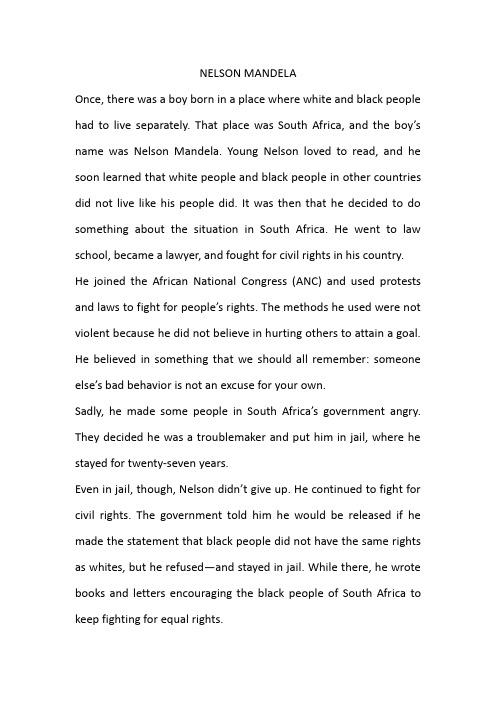
NELSON MANDELAOnce, there was a boy born in a place where white and black people had to live separately. That place was South Africa, and the boy’s name was Nelson Mandela. Young Nelson loved to read, and he soon learned that white people and black people in other countries did not live like his people did. It was then that he decided to do something about the situation in South Africa. He went to law school, became a lawyer, and fought for civil rights in his country. He joined the African National Congress (ANC) and used protests and laws to fight for people’s rights. The methods he used were not violent because he did not believe in hurting others to attain a goal. He believed in something that we should all remember: someone else’s bad behavior is not an excuse for your own.Sadly, he made some people in South Africa’s government angry. They decided he was a troublemaker and put him in jail, where he stayed for twenty-seven years.Even in jail, though, Nelson didn’t give up. He continued to fight for civil rights. The government told him he would be released if he made the statement that black people did not have the same rights as whites, but he refused—and stayed in jail. While there, he wrote books and letters encouraging the black people of South Africa to keep fighting for equal rights.When he got out of jail, Nelson was so popular and loved that he was elected president of South Africa. He went on to inspire people and change the laws he’d fought against when he was younger.How can you inspire others? You can inspire people in so many ways. Your actions should inspire others to dream more, learn more, do more, and become more. Being your best self inspires others to do the same.Did you know that Nelson’s last name on his birth certificate was Roli hlahla? In his Xhosa tribe’s language, this name means “pulling the branch of a tree” or “troublemaker.”。
Unit-5-Nelson-Mandela语言知识点与运用
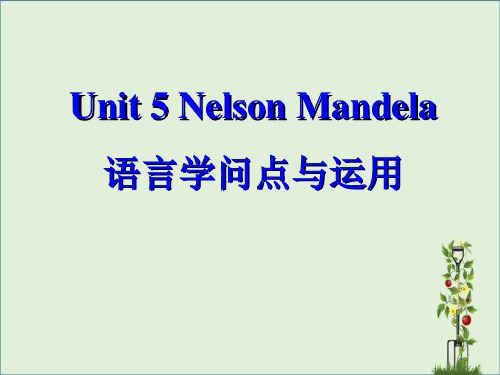
9. believe in
1. 信仰 Christians believe in Jesus. 基督徒信仰 。 2. 信任 We believe in him. 我们信任他。
3. 信任...的效用 Jim believes in fresh air and morning exercises. 吉姆坚信新颖空气及早操有好处。
12. fight against/for/with The soldiers fought bravely _a_g_a_i_n_st_ the enemy _fo_r_ the liberation _w_i_th_ their comrades.
13. be…away有…远(指距离、时间) 1) 我家离这里只有两条街。
My house is only 2 blocks away from here. 2) 他的生日在两周以后。 His birthday is two weeks away.
in two weeks.
14. worry vt. worry sb. that 使某人担忧 worry oneself 使自己担忧
17. The last thirty years have seen the greatest number of… 某些动词(see, find, witness等)主语有时不 是人而是物, 即拟人用法, 使句子生动。 1) This old house has seen good days. 2) Dusk (黄昏) found a boy crying in the
7. die for 为某种事业或目的而死 die for one’s country/ the people/ the
cause. die of 死于内因 die from 死于外因 die from a car accident. 由于车祸而死 die by 死于暴力, 刀或剑等凶器 die by the sword/hanging.
高中英语 Unit 5 Nelson Mandela — a modern hero Section
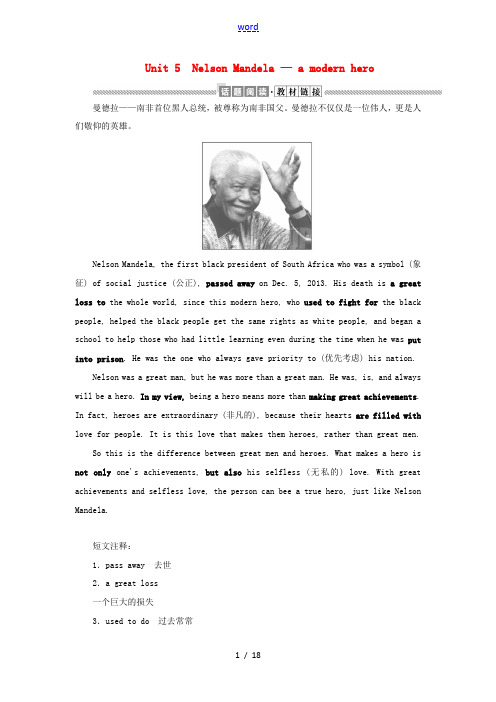
Unit 5 Nelson Mandela — a modern hero曼德拉——南非首位黑人总统,被尊称为南非国父。
曼德拉不仅仅是一位伟人,更是人们敬仰的英雄。
Nelson Mandela, the first black president of South Africa who was a symbol (象征) of social justice (公正), passed away on Dec. 5, 2013. His death is a great loss to the whole world, since this modern hero, who used to fight for the black people, helped the black people get the same rights as white people, and began a school to help those who had little learning even during the time when he was put into prison. He was the one who always gave priority to (优先考虑) his nation.Nelson was a great man, but he was more than a great man. He was, is, and always will be a hero. In my view, being a hero means more than making great achievements. In fact, heroes are extraordinary (非凡的), because their hearts are filled with love for people. It is this love that makes them heroes, rather than great men.So this is the difference between great men and heroes. What makes a hero is not only one's achievements, but also his selfless (无私的) love. With great achievements and selfless love, the person can bee a true hero, just like Nelson Mandela.短文注释:1.pass away 去世2.a great loss一个巨大的损失3.used to do 过去常常4.fight for... 为……而奋斗5.put... into prison将……投入监狱6.in my view 在我看来7.make great achievements取得巨大成就8.be filled with 充满9.not only... but also...不但……而且……Section ⅠWarming Up & Reading —Prereading重点单词写作词汇1.quality n.质量;品质;性质2.mean adj. 吝啬的;自私的;卑鄙的3.generous adj. 慷慨的;大方的4.found vt. 建立;建设5.principle n. 法则;原则6.stage n. 舞台;阶段;时期7.vote vt.&vi. 投票;选举n. 投票;选票;表决8.attack vt. 进攻;攻击;抨击拓展词汇1.active adj.积极的;活跃的→actively adv.积极地→activity n.活动2.devote vt.(与to连用)献身;专心于→devoted adj.忠实的;深爱的→devotion n.热爱;献身;奉献3.peaceful adj.和平的;平静的;安宁的→peacefully adv.和平地→peacen.和平;平静;和睦①peace→peaceful和平的②pain→painful 痛苦的③harm→harmful 有害的④power→powerful 强大的⑤meaning→meaningful 有意义的⑥cheer→cheerful 欢乐的后缀ance高频名词全接触①guidance 指导;领导②importance 重要;重要性③ignorance 无知;愚昧④signifi cance 意义;重要性⑤appearance 出现⑥tolerance 宽容;容忍self反身代词①myself 我自己②yourself 你自己③himself 他自己④herself 她自己⑤itself 它自己⑥ourselves 我们自己⑦yourselves 你们自己⑧themselves 他们自己“out of+n.”短语集锦①out of work失业②out of control 失控③out of mind 心不在焉④out of order 有毛病;出故障⑤out of sight 看不见“in+n.”短语面面观①in trouble 在困境中②in danger 处于危险中③in return 作为回报④in vain 徒劳地⑤in order 井然有序⑥in place 在适当的位置Step One:Warming upA famous person may not be a great person, but a great person must be a famous person.1.Who do you think are great persons in the following pictures?答案:A,B and E2.What do you know about Nelson Mandela?He_devotes_his_life_to_helping_his_people_get_the_same_rights_as_white_peop le_in_his_country./He_is_a_national_leader_who_has_been_fighting_for_making_bla ck_and_white_people_equal./Nelson_Mandela_is_regarded_as_one_of_the_greatest_sp iritual_and_political_leaders_of_our_time.Step Two:Fast readingSkim the text and choose the best answers.1.What's the main idea of the text?A.The life of black workers.B.The fight between Mandela and the white people.C.The stories between Mandela and Elias.D.The education of Elias.答案:C2.Match the main idea of each part.Paras.1~2(B) A.The change of Elias' life after he met Nelson Mandela and what Mandela didParas.3~7(A) B.The life of Elias before he met Nelson MandelaStep Three:Careful readingRead the reading passage carefully and choose the best answers according to the text.1.Why did Elias have to leave school?A.He didn't have a passbook.B.His home was far from the school.C.His family couldn't afford the school fees.D.He couldn't read or write.答案:C2.Nelson Mandela opened a black law firm in order to ________.A.make moneyB.help the poor black people with their problemsC.make himself famousD.study law答案:B3.How did Nelson Mandela help Elias keep his job?A.He talked with Elias' boss.B.He helped him get the correct papers.C.He lent him some money.D.He asked him to go to court.答案:B4.What dream did Nelson Mandela have?A.To bee the president of South Africa.B.To win the Nobel Peace Prize.C.To make black and white people equal.D.To blow up some government buildings.答案:CStep Four:Explain difficult sentences1.The time when I first met Nelson Mandela was a very difficult period of my life.[句式分析][尝试翻译]第一次见到纳尔逊·曼德拉的时候,是我一生中非常艰难的时期。
克服困难实现梦想的人物

克服困难实现梦想的人物有很多杰出的人物在面对重重困难时成功实现了自己的梦想。
以下是一些克服困难实现梦想的杰出人物:1. **贝利·纳尔逊·曼德拉(Nelson Mandela):**- 曼德拉是南非的反种族隔离活动家,被关押27年之久。
尽管遭受巨大的压力和不公,但他坚持自己的信仰,最终在1994年成为南非第一位黑人总统,成功推动国家走向和解与平等。
2. **海伦·凯勒(Helen Keller):**- 凯勒在幼年时因疾病失去了视力和听力,但她通过勇气和毅力克服了身体上的困难,最终成为一位作家和社会活动家。
她的故事鼓舞了许多人,展示了战胜不可思议困难的力量。
3. **史蒂芬·霍金(Stephen Hawking):**- 世界著名的理论物理学家,霍金在年轻时被诊断患有肌萎缩侧索硬化症(ALS),导致他几乎完全丧失了运动能力。
然而,他通过坚韧不拔的努力,继续进行卓越的科学研究,成为现代科学的巨星。
4. **奥普拉·温弗瑞(Oprah Winfrey):**- 从贫困家庭出发,奥普拉在早年面临了极大的困境,包括贫困、性侵和种族歧视。
然而,她通过勤奋工作和坚持不懈的努力,成为美国最成功的女性媒体企业家之一,同时也是慈善家和激励者。
5. **尤金·奥尼尔(Eugene O'Neill):**- 美国戏剧家奥尼尔在个人生活中面临家庭问题、心理健康挑战以及酗酒问题。
然而,他的作品却为他赢得了多个普利策奖和诺贝尔文学奖,被誉为美国戏剧之父。
这些人物的故事告诉我们,即使面对巨大的困难,坚持信念、努力拼搏和对梦想的执着,都能够帮助人们克服各种困境,最终实现自己的梦想。
纳尔逊·曼德拉语录

纳尔逊·曼德拉语录"Education is the most powerful weapon which you can use to change the world." - Nelson Mandela"教育是你可以用来改变世界的最强大的武器。
" - 纳尔逊·曼德拉"It always seems impossible until it's done." - Nelson Mandela"直到完成之前,一切都看似不可能。
" - 纳尔逊·曼德拉"I am fundamentally an optimist. Whether that comes from nature or nurture, I cannot say. Part of being optimistic is keeping one's head pointed toward the sun, one's feet moving forward. There were many dark moments when my faith in humanity was sorely tested, but I would not and could not give myself up to despair. That way lays defeat and death." - Nelson Mandela"我基本上是一个乐观主义者。
无论这是源于天性还是培养,我无法说。
乐观的一部分是把头朝向太阳,脚步向前迈进。
在我对人性的信念受到严峻考验的许多黑暗时刻,但我不会也不能陷入绝望。
那样只会导致失败和死亡。
" - 纳尔逊·曼德拉"I learned that courage was not the absence of fear, but the triumph over it. The brave man is not he who does not feel afraid, but he who conquers that fear." - Nelson Mandela"我学到,勇气并不是不害怕,而是战胜它。
我最崇拜的政治家英语作文

我最崇拜的政治家英语作文全文共3篇示例,供读者参考篇1The political leader I admire the most is Nelson Mandela.Nelson Mandela was born in South Africa in 1918. He fought against the apartheid regime in his country and was eventually imprisoned for 27 years. Despite this, Mandela always remained committed to his cause and never wavered in his belief in equality and justice for all.When Mandela was released from prison in 1990, he became a symbol of hope and reconciliation for South Africans and the world. He went on to become the President of South Africa in 1994, leading the country through a peaceful transition to democracy and playing a key role in the dismantling of the apartheid system.Mandela's leadership style was characterized by his humility, compassion, and commitment to reconciliation. He believed in the power of forgiveness and understanding, and he worked tirelessly to build a society where all people could live in harmony and respect. Mandela's ability to forgive his oppressorsand work with them to build a better future for all remains an inspiration to people around the world.Throughout his life, Mandela was a tireless advocate for human rights, social justice, and peace. He received numerous awards and honors for his work, including the Nobel Peace Prize in 1993. Mandela's legacy continues to inspire people to work for a better world, where all people are treated with dignity and respect.In conclusion, Nelson Mandela is the political leader I admire the most because of his courage, integrity, and commitment to justice. He showed the world the power of forgiveness and reconciliation, and his legacy continues to inspire us to work for a more just and equitable society. Mandela's life and work remind us that change is possible, and that we all have a role to play in building a better world for future generations.篇2The political leader I admire most is Nelson Mandela. Nelson Mandela was a South African anti-apartheid revolutionary, political leader, and philanthropist who served as President of South Africa from 1994 to 1999. He was the country's first black head of state and the first elected in a fully representativedemocratic election. Mandela's government focused on dismantling the legacy of apartheid through tackling institutionalized racism and fostering reconciliation.There are several reasons why I admire Nelson Mandela. Firstly, his commitment to peace and reconciliation is truly inspiring. Despite spending 27 years in prison for hisanti-apartheid activities, Mandela emerged from prison with a message of forgiveness and unity. He understood the importance of building a new South Africa based on reconciliation rather than retaliation. His ability to forgive his oppressors and work towards a peaceful resolution to the racial tensions in the country is a testament to his remarkable character.Secondly, Mandela's dedication to social justice and equality is commendable. He fought tirelessly against the apartheid regime in South Africa, believing that all people should be treated equally regardless of their race. His efforts to end institutionalized racism and promote equality for all citizens of South Africa have had a lasting impact on the country.Additionally, Mandela's leadership style is worthy of admiration. He was a charismatic and eloquent speaker who was able to inspire others to follow his vision of a free and equalSouth Africa. He led by example, demonstrating courage, integrity, and humility in the face of adversity.In conclusion, Nelson Mandela is a political leader whom I greatly admire for his commitment to peace, reconciliation, social justice, and equality. His legacy continues to inspire people around the world to work towards a more just and inclusive society. Mandela's leadership and values serve as a shining example for future generations of leaders to emulate.篇3The Political Leader I Admire MostPolitics has always been a subject of great interest and debate for me. I have always been fascinated by the ability of political leaders to make decisions that impact the lives of millions of people. Among the many political figures in history, there is one leader whom I admire the most - Nelson Mandela.Nelson Mandela, the former President of South Africa, is widely regarded as one of the greatest political leaders of the 20th century. Born on July 18, 1918, Mandela dedicated his life to fighting against apartheid in South Africa. He spent 27 years in prison for his beliefs and was eventually released in 1990. Four years later, Mandela was elected as the first black President ofSouth Africa in the country's first fully representative democratic election.What I admire most about Nelson Mandela is his unwavering commitment to justice, freedom, and equality. Despite facing immense challenges and hardships, Mandela never wavered in his belief that all people should be treated equally, regardless of their race, religion, or background. His famous quote, "It always seems impossible until it is done," is a testament to his resilience and determination in the face of adversity.Mandela's leadership style was characterized by his ability to inspire and unite people from diverse backgrounds. He believed in the power of reconciliation and forgiveness, and he worked tirelessly to bridge the gap between black and white South Africans. Mandela's efforts to promote reconciliation and unity in South Africa earned him the Nobel Peace Prize in 1993.In addition to his efforts to end apartheid and promote reconciliation, Mandela was also a champion of human rights and social justice. He worked to improve the lives of millions of South Africans by promoting education, healthcare, and economic development. Mandela's legacy continues to inspire people around the world to fight for social justice and equality.In conclusion, Nelson Mandela is the political leader I admire most because of his unwavering commitment to justice, freedom, and equality. His leadership style, resilience, and dedication to improving the lives of others make him a true inspiration. Mandela's legacy reminds us of the power of hope, unity, and reconciliation in the face of adversity. He will always be remembered as a symbol of courage, compassion, and humanity.。
曼德拉 介绍英文作文
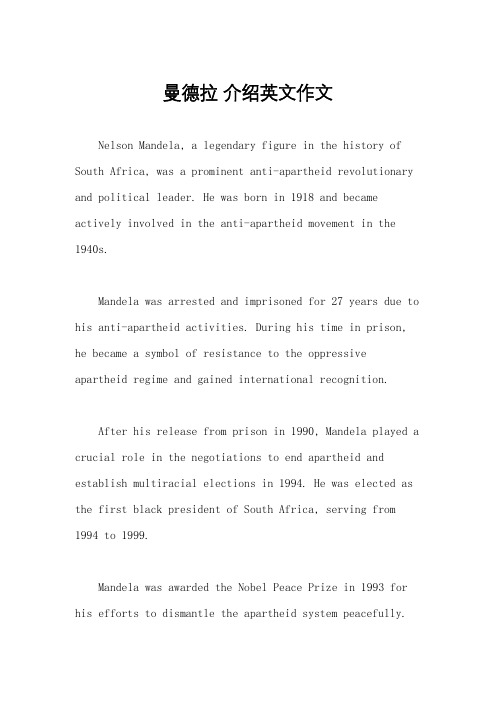
曼德拉介绍英文作文Nelson Mandela, a legendary figure in the history of South Africa, was a prominent anti-apartheid revolutionary and political leader. He was born in 1918 and became actively involved in the anti-apartheid movement in the 1940s.Mandela was arrested and imprisoned for 27 years due to his anti-apartheid activities. During his time in prison, he became a symbol of resistance to the oppressive apartheid regime and gained international recognition.After his release from prison in 1990, Mandela played a crucial role in the negotiations to end apartheid and establish multiracial elections in 1994. He was elected as the first black president of South Africa, serving from 1994 to 1999.Mandela was awarded the Nobel Peace Prize in 1993 for his efforts to dismantle the apartheid system peacefully.He is widely regarded as a symbol of peace, forgiveness, and reconciliation, and his legacy continues to inspire people around the world.Mandela passed away in 2013, but his impact on South Africa and the world will never be forgotten. He remains a symbol of courage and resilience, and his contributions to the fight against apartheid will always be remembered.。
高一英语必修一Unit5课文翻译
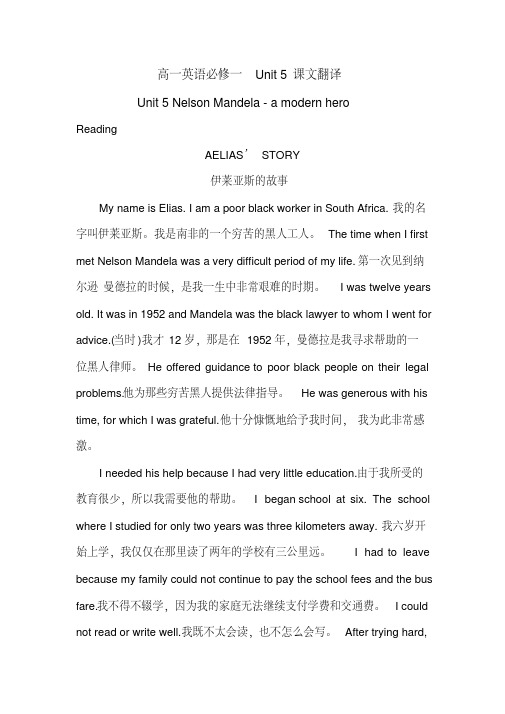
高一英语必修一Unit 5课文翻译Unit 5 Nelson Mandela - a modern heroReadingAELIAS’ STORY伊莱亚斯的故事My name is Elias. I am a poor black worker in South Africa.我的名字叫伊莱亚斯。
我是南非的一个穷苦的黑人工人。
The time when I first met Nelson Mandela was a very difficult period of my life.第一次见到纳尔逊·曼德拉的时候,是我一生中非常艰难的时期。
I was twelve years old. It was in 1952 and Mandela was the black lawyer to whom I went for advice.(当时)我才12岁,那是在1952年,曼德拉是我寻求帮助的一位黑人律师。
He offered guidance to poor black people on their legal problems.他为那些穷苦黑人提供法律指导。
He was generous with his time, for which I was grateful.他十分慷慨地给予我时间,我为此非常感激。
I needed his help because I had very little education.由于我所受的教育很少,所以我需要他的帮助。
I began school at six. The school where I studied for only two years was three kilometers away.我六岁开始上学,我仅仅在那里读了两年的学校有三公里远。
I had to leave because my family could not continue to pay the school fees and the bus fare.我不得不辍学,因为我的家庭无法继续支付学费和交通费。
高中英语复习 Nelson Mandela—a modern hero

(二)语境记忆短语——不枯燥·兴趣高
记全记牢
1. out of work
失业
2. as a matter of fact 事实上
3. in one's opinion/view 在某人看来
2.Thanks to your generous (慷慨的) help, I do believe that I will
have a better understanding of your country and culture. 3.Thanks to these effective measures, the air quality (质量) in the
5. warmhearted adj. 热心肠的 6. unfair adj. 不公正的;不公平的
7. attack vt. 进攻;攻击;抨击
8. president n. 总统;会长;校长;行长
核心单词练通
1.There is no denying that China is playing an important role on the international political stage (舞台).
5.He criticized violently that the government did little to stop the
violence in the country.(violent)
6.China is known to be a peaceful country. It's been a model of
- 1、下载文档前请自行甄别文档内容的完整性,平台不提供额外的编辑、内容补充、找答案等附加服务。
- 2、"仅部分预览"的文档,不可在线预览部分如存在完整性等问题,可反馈申请退款(可完整预览的文档不适用该条件!)。
- 3、如文档侵犯您的权益,请联系客服反馈,我们会尽快为您处理(人工客服工作时间:9:00-18:30)。
引言Nelson Mandela was the most famous prisoner in the world. He is probably now one of the most famous grandfathers in the world!
VHILDHOOD: He was a country boy. When I first knew him he lived in a small village near the Indian Ocean.With his mother and his three sisters,he ate meals out of a communal pot.The food was usually samp,a porridge made from corn on the cab.
Mandela said:"Mmm it was delicious"
A LEADER:He went to Johannesburg,the City of Gold.It was a good place for rich white people but hard work for the black men. He decided to study ter,he opened a lawyers's office. He joined the African National Congress, which helped black people. He became one of its leaders. PRISON:The prisoners were considered dangerous.The police flew them to Robben Island prison where was a green place with penguins,antelopes amd a lovely view of Table Mountain. But it was a fortress,guarded daa and night.In winter Mandela shivered under thin blankets but only wore a shirt, shorts and sandals. And they had to do heavy work.Their food without nutrition to the Christmas Day with be more than to provide of coffee.They separated from their
families,Nelson said a letter was like the summer rain which makes the desert bloom.But he wrote the story of his life and buried the book at night.It was sumuggled out.After a long time,the outside world heard about them.And wore T-shirt saying:"Release Nelson Mandela"He was becoming as big a nuisance inside prison.
MR PRESIDENT: He was freed from prison.So,millions could at last see him on TV.Four years later,he became president of the South Africa,all the people voted on the election.He walkedin the gardens of Buckingham Palace.Hw told her he want to build home.He make the law of racial segregation.Many South African from lots of is why it is called The Rambow Nation。
